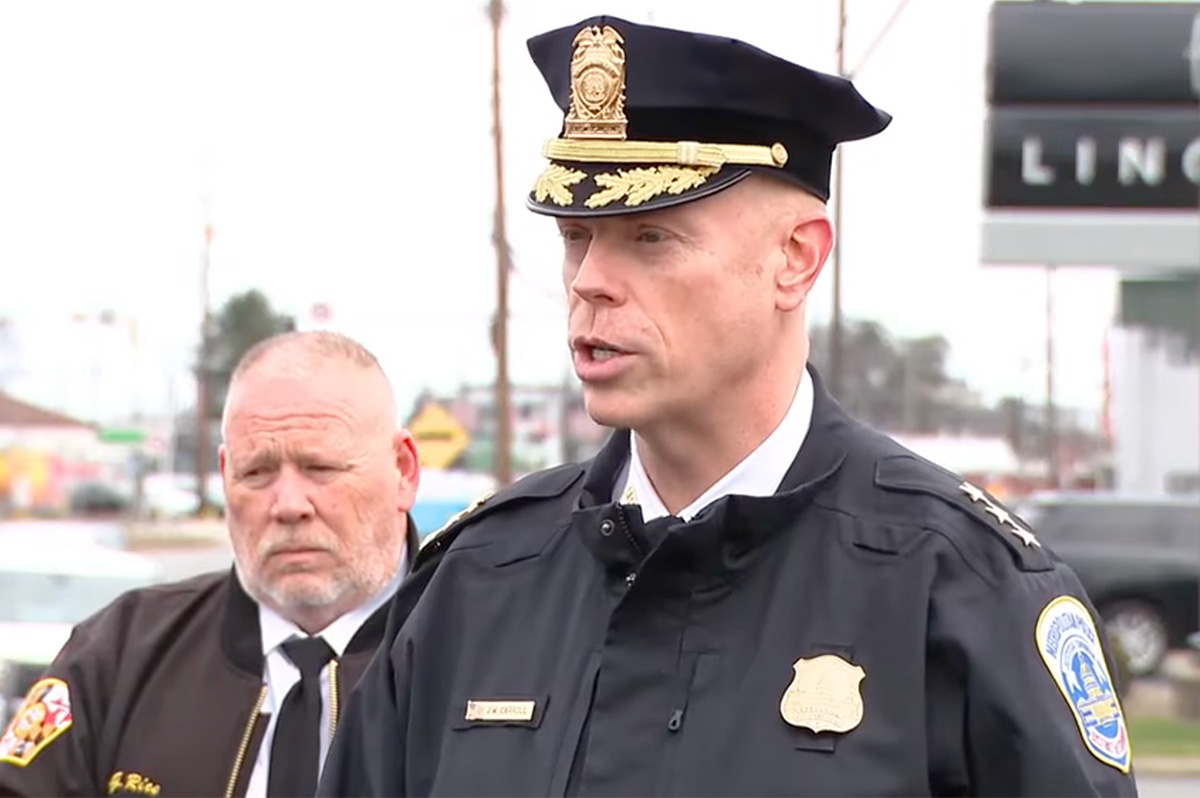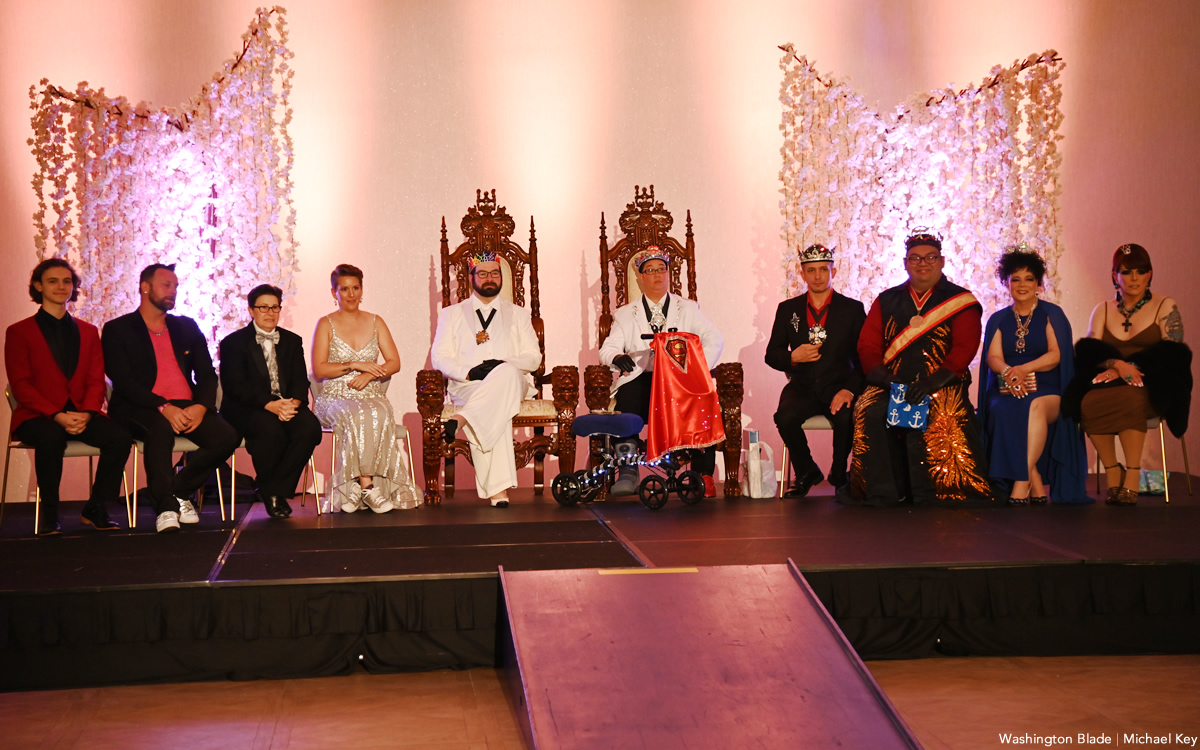District of Columbia
Murdered Israeli embassy officials were supporters of D.C.’s LGBTQ synagogue
Bet Mishpachah calls fatal shooting outside Capital Jewish Museum ‘devastating’

The two Israeli embassy officials who were shot to death outside D.C.’s Capital Jewish Museum Wednesday evening, May 21, were strong supporters of Bet Mishpachah, D.C.’s LGBTQ supportive synagogue, according to a statement it released.
“We are especially devastated by the loss of our dear colleague and friend of Bet Mishpachah, Sarah Milgram, and her soon to be fiancé, Yaron Lischinsky,” the LGBTQ synagogue said in a May 22 statement.
“Sarah was the liaison between Bet Mishpachah and the Israeli Embassy, working closely with our staff and clergy,” the statement says. “Her warmth, professionalism, and deep commitment to building bridges within the Jewish community made her not only a trusted partner but a beloved part of our extended congregational family,” according to the statement.
A statement also released on May 22 by the office of the United States Attorney for the District of Columbia says Chicago resident Elias Rodriguez, 30, has been charged with two counts of first-degree murder along with other weapons related charges in connection with the shooting deaths of Milgram and Lischinsky.
Officials with the D.C. police and the FBI, which has joined D.C. police in continuing to investigate the case, have said Rodriquez arrived in D.C. from Chicago one day prior to the shooting and appears to have targeted an event taking place at the Capital Jewish Museum for violence at the time it was hosting an event called “Young Diplomats Reception,” in which Israeli Embassy officials were in attendance.
Police and FBI officials have said Rodriguez allegedly shot Milgrim and Lischinsky after they left the Capital Jewish Museum at the conclusion of the event. The museum is located at 575 3rd Street, N.W.
“Surveillance footage reportedly shows Rodriquez walking past the victims before turning and firing multiple rounds,” the U.S. Attorney’s statement says. “After the victims fell, he allegedly continued firing at close range, including as one attempted to crawl away,” it says, adding, “Investigators recovered a 9 mm handgun and 21 spent shell casings at the scene.”
Police have said Rodriguez walked into the Capital Jewish Museum after the shooting and was detained by security guards until D.C. police arrived. Witnesses said he began to shout, “free, free Palestine” before police took him into custody.
“Make no mistake, this attack was targeted, antisemitic violence,” said Steven Jenson, an FBI assistant director working on the investigation. “The FBI will continue to pursue all leads and use all available resources to investigate this heinous murder,” he said in the statement.
The fatal shooting took place five days after the Capital Jewish Museum opened a special exhibition called “LGBT Jews in the Federal City” on May 16. “This landmark exhibition explores a turbulent century of celebrations, activism, and change in the nation’s capital by D.C.’s LGBTQ+ Jewish community,” the museum said in a statement announcing the exhibition.
Photos and documents related to Bet Mishpachah make up a prominent part of the exhibition.
During a May 22 press conference organized by the U.S. Attorney for D.C., Jeanine Pirro, to provide an update on the investigation into the two murders, Pirro and FBI official Jensen referred to the two murders as a hate crime and terrorist act.
In response to a question from the Washington Blade asking if investigators were looking into whether the LGBTQ exhibition at the Capital Jewish Museum might have played some role in Gonzales’s motive for targeting the museum, Pirro responded to the question.
“So, we are looking into absolutely everything,” she said. “There is so much information we’re looking at. And I must tell you, coming from New York, I’ve never seen the cooperation and coordination that I’m seeing here. It was immediate. It was instant. It was coordinated. And my hat’s off to this area. We’re going to clean it up, thank you,” she said in ending the press conference.
Josh Maxey, Bet Mishpachah’s executive director, said he and Israeli Embassy official Milgram became friends during their two-and-a-half-year interaction working on joint events between the embassy and Bet Mishpachah.
“This became a wonderful two and a half years journey of putting events together, of hosting events together, doing different programs for the community,” Maxey told the Blade. Among the activities the two worked on, he said, was the embassy’s annual LGBTQ Pride event.
Maxie said his own grieving over the death of Milgram and her boyfriend Lischinsky was heightened by the fact that he spoke with her by phone on the day of the shooting shortly before she arrived at the Jewish Museum over plans about this year’s LGBTQ Pride events.
“Sarah really championed us to be included in Israeli events,” Maxey said. “And so, I am just devastated that this true embodiment of an ally was so viciously and violently taken away from us.”
District of Columbia
Kennedy Center renaming triggers backlash
Artists who cancel shows threatened; calls for funding boycott grow

Efforts to rename the Kennedy Center to add President Trump’s name to the D.C. arts institution continue to spark backlash.
A new petition from Qommittee , a national network of drag artists and allies led by survivors of hate crimes, calls on Kennedy Center donors to suspend funding to the center until “artistic independence is restored, and to redirect support to banned or censored artists.”
“While Trump won’t back down, the donors who contribute nearly $100 million annually to the Kennedy Center can afford to take a stand,” the petition reads. “Money talks. When donors fund censorship, they don’t just harm one institution – they tell marginalized communities their stories don’t deserve to be told.”
The petition can be found here.
Meanwhile, a decision by several prominent musicians and jazz performers to cancel their shows at the recently renamed Trump-Kennedy Center in D.C. planned for Christmas Eve and New Year’s Eve has drawn the ire of the Center’s president, Richard Grenell.
Grenell, a gay supporter of President Donald Trump who served as U.S. ambassador to Germany during Trump’s first term as president, was named Kennedy Center president last year by its board of directors that had been appointed by Trump.
Last month the board voted to change the official name of the center from the John F. Kennedy Memorial Center For The Performing Arts to the Donald J. Trump And The John F. Kennedy Memorial Center For The Performing Arts. The revised name has been installed on the outside wall of the center’s building but is not official because any name change would require congressional action.
According to a report by the New York Times, Grenell informed jazz musician Chuck Redd, who cancelled a 2025 Christmas Eve concert that he has hosted at the Kennedy Center for nearly 20 years in response to the name change, that Grenell planned to arrange for the center to file a lawsuit against him for the cancellation.
“Your decision to withdraw at the last moment — explicitly in response to the Center’s recent renaming, which honors President Trump’s extraordinary efforts to save this national treasure — is classic intolerance and very costly to a non-profit arts institution,” the Times quoted Grenell as saying in a letter to Redd.
“This is your official notice that we will seek $1 million in damages from you for this political stunt,” the Times quoted Grenell’s letter as saying.
A spokesperson for the Trump-Kennedy Center did not immediately respond to an inquiry from the Washington Blade asking if the center still planned to file that lawsuit and whether it planned to file suits against some of the other musicians who recently cancelled their performances following the name change.
In a follow-up story published on Dec. 29, the New York Times reported that a prominent jazz ensemble and a New York dance company had canceled performances scheduled to take place on New Year’s Eve at the Kennedy Center.
The Times reported the jazz ensemble called The Cookers did not give a reason for the cancellation in a statement it released, but its drummer, Billy Hart, told the Times the center’s name change “evidently” played a role in the decision to cancel the performance.
Grenell released a statement on Dec. 29 calling these and other performers who cancelled their shows “far left political activists” who he said had been booked by the Kennedy Center’s previous leadership.
“Boycotting the arts to show you support the arts is a form of derangement syndrome,” the Times quoted him as saying in his statement.
District of Columbia
New interim D.C. police chief played lead role in security for WorldPride
Capital Pride says Jeffery Carroll had ‘good working relationship’ with organizers

Jeffery Carroll, who was named by D.C. Mayor Muriel Bowser on Dec. 17 as the city’s Interim Chief of Police, played a lead role in working with local LGBTQ community leaders in addressing public safety issues related to WorldPride 2025, which took place in D.C. last May and June
“We had a good working relationship with him, and he did his job in relation to how best the events would go around safety and security,” said Ryan Bos, executive director of Capital Pride Alliance.
Bos said Carroll has met with Capital Pride officials in past years to address security issues related to the city’s annual Capital Pride parade and festival and has been supportive of those events.
At the time Bowser named him Interim Chief, Carroll had been serving since 2023 as Executive Assistant Chief of Specialized Operations, overseeing the day-to-day operation of four of the department’s bureaus. He first joined the D.C. Metropolitan Police Department in 2002 and advanced to multiple leadership positions across various divisions and bureaus, according to a statement released by the mayor’s office.
“I know Chief Carroll is the right person to build on the momentum of the past two years so that we can continue driving down crime across the city,” Bowser said in a statement released on the day she announced his appointment as Interim Chief.
“He has led through some of our city’s most significant public safety challenges of the past decade, he is familiar with D.C. residents and well respected and trusted by members of the Metropolitan Police Department as well as our federal and regional public safety partners,” Bowser said.
“We have the best police department in the nation, and I am confident that Chief Carroll will meet this moment for the department and the city,” Bowser added.
But Bowser has so far declined to say if she plans to nominate Carroll to become the permanent police chief, which requires the approval of the D.C. City Council. Bowser, who announced she is not running for re-election, will remain in office as mayor until January 2027.
Carroll is replacing outgoing Chief Pamela Smith, who announced she was resigning after two years of service as chief to spend more time with her family. She has been credited with overseeing the department at a time when violent crime and homicides declined to an eight-year low.
She has also expressed support for the LGBTQ community and joined LGBTQ officers in marching in the WorldPride parade last year.
But Smith has also come under criticism by members of Congress, who have accused the department of manipulating crime data allegedly showing lower reported crime numbers than actually occurred. The allegations came from the Republican-controlled U.S. House Oversight Committee and the U.S. Justice Department
Bowser has questioned the accuracy of the allegations and said she has asked the city’s Inspector General to look into the allegations.
Meanwhile, a spokesperson for the D.C. police Office of Public Affairs did not immediately respond to a question from the Washington Blade about the status of the department’s LGBT Liaison Unit. Sources familiar with the department have said a decline in the number of officers currently working at the department, said to be at a 50-year low, has resulted in a decline in the number of officers assigned to all of the liaison units, including the LGBT unit.
Among other things, the LGBT Liaison Unit has played a role in helping to investigate hate crimes targeting the LGBTQ community. As of early Wednesday an MPD spokesperson did not respond to a question by the Blade asking how many officers are currently assigned to the LGBT Liaison Unit.
District of Columbia
Imperial Court of Washington drag group has ‘dissolved’
Board president cites declining support since pandemic

The Imperial Court of Washington, a D.C.-based organization of drag performers that has raised at least $250,000 or more for local LGBTQ and non-LGBTQ charitable groups since its founding in 2010, announced on Jan. 5 that it has ended its operations by dissolving its corporate status.
In a Jan. 5 statement posted on Facebook, Robert Amos, president of the group’s board of directors, said the board voted that day to formally dissolve the organization in accordance with its bylaws.
“This decision was made after careful consideration and was based on several factors, including ongoing challenges in adhering to the bylaws, maintaining compliance with 501(c)(3) requirements, continued lack of member interest and attendance, and a lack of community involvement and support as well,” Amos said in his statement.
He told the Washington Blade in a Jan. 6 telephone interview that the group was no longer in compliance with its bylaws, which require at least six board members, when the number of board members declined to just four. He noted that the lack of compliance with its bylaws also violated the requirements of its IRS status as a nonprofit, tax-exempt 501(c) (3) organization.
According to Amos, the inability to recruit additional board members came at a time when the organization was continuing to encounter a sharp drop in support from the community since the start of the COVID pandemic around 2020 and 2021.
Amos and longtime Imperial Court of Washington member and organizer Richard Legg, who uses the drag name Destiny B. Childs, said in the years since its founding, the group’s drag show fundraising events have often been attended by 150 or more people. They said the events have been held in LGBTQ bars, including Freddie’s Beach Bar in Arlington, as well as in other venues such as theaters and ballrooms.
Among the organizations receiving financial support from Imperial Court of Washington have been SMYAL, PFLAG, Whitman-Walker Health’s Walk to End HIV, Capital Pride Alliance, the DC LGBT Community Center, and the LGBTQ Fallen Heroes Fund. Other groups receiving support included Pets with Disabilities, the Epilepsy Foundation of Washington, and Grandma’s House.
The Imperial Court of Washington’s website, which was still online as of Jan. 6, says the D.C. group has been a proud member of the International Court System, which was founded in San Francisco in 1965 as a drag performance organization that evolved into a charitable fundraising operation with dozens of affiliated “Imperial Court” groups like the one in D.C.
Amos, who uses the drag name Veronica Blake, said he has heard that Imperial Court groups in other cities including Richmond and New York City, have experienced similar drops in support and attendance in the past year or two. He said the D.C. group’s events in the latter part of 2025 attracted 12 or fewer people, a development that has prevented it from sustaining its operations financially.
He said the membership, which helped support it financially through membership dues, has declined in recent years from close to 100 to its current membership of 21.
“There’s a lot of good we have done for the groups we supported, for the charities, and the gay community here,” Amos said. “It is just sad that we’ve had to do this, mainly because of the lack of interest and everything going on in the world and the national scene.”



















